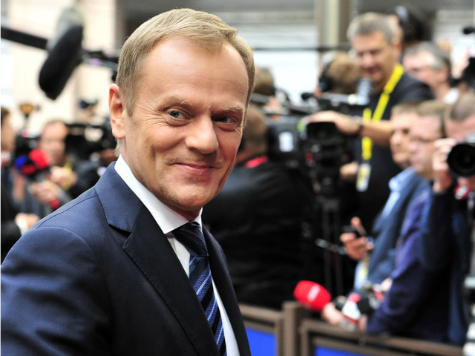Seventy-five years to the day after it was invaded and nearly wiped off the map by Nazi Germany, today’s Poland is more peaceful, united, and powerful than it has been since the late medieval glory days of her fabled 16th century Jagiellonian kings. The wealth and prosperity of current Poland dwarfs anything that prevailed from that bygone era.
Poland’s remarkable transformation was made complete with Sunday’s election of Polish Prime Minister Donald Tusk as president of the European Council. The Council is the arm of the European Union that coordinates the giant trading block’s disparate agendas, as well as formally representing EU member states at international and multinational gatherings.
Poland’s rise as a leading European power and the dominant voice on affairs relating to Eastern Europe is nothing short of astonishing. Left for dead at the end of the World War II, Poland spent the next 45 years as a communist satellite state under near-complete Soviet domination. Poland, finding itself wedged between two historically expansionist powers, has only experienced 45 years of true independence since she was first partitioned in 1772.
When Poland did finally emerge from under the rubble of a collapsed Soviet Union in 1989, she was bankrupt and backwards. Poland’s prospects were judged as poor, especially when measured against Hungary and the Czech Republic. Not only were her people financially poor, many wondered whether their divide with the West was not pre-ordained.
Poland had virtually no modern infrastructure and no productive industries. In 1990, the economies of Poland and Ukraine were roughly the same size; GDP back then was roughly $1,600 in both countries. That year, Poland began a quarter century commitment to free market principles and policies that included everything from balanced budgets, to standing firm against wage hikes and removing artificial price controls, all of which have continued more or less uninterrupted until today, all of which triggered an economic boom without equal. Today, Poland is by far Europe’s fastest growing economy with a per capital GDP of more than $13,000 per year, five times richer than Ukraine.
Following a few early years of painful recession in 1990-91, remarkably, Poland has, without exception, grown every year since. Since joining the EU in 2004, economic growth has averaged more than four percent a year. Poland’s per capita purchasing power parity has already reached more than two-third the EU average, more than double what it was in 1990. Poland is the only big economy in Europe that has not experienced recession since 1991. It even kept growing during the 2008 financial crisis that devastated so much of Europe. This was no accident; it was due to responsible fiscal and monetary policies and low debt. Poland’s 2013 GDP was just over a trillion dollars, 20% higher than it was in 2008.
Poland is now the sixth-largest economy in the EU–behind only Germany, Britain, France, Italy, and Spain. Next to German-French ties, Poland’s bilateral relationship with Germany is now arguably the second-most important in the EU.
Under the leadership of Tusk, Poland has made the most stringent calls for an increased military commitment on the part of all NATO members to collectively confront the growing threats emanating from a revanchist Russia, Poland’s centuries-long antagonist.
Not all is rosy, as Prime Minister Tusk knows only too well. Poland still relies upon Russia for more than 60% of its natural gas, which is why Tusk called his election “a huge opportunity to introduce Eastern and Central European energy” into European affairs.
Referring to rising tensions between Russia and Ukraine, both of which share long borders with Poland, Tusk said, “Our goal is peace.” Poland has been lobbying for a senior EU post for years upon the argument that former Soviet bloc nations more than deserved the chance to help lead the union. Poles regularly reminded other members that their country was the only one in the 28-nation bloc where support for enhanced European Union integration actually rose during the Euro crisis of 2009-2012. While anti-EU feelings have been rising markedly in other nations, approval of the EU has been on the rise in Poland in nearly every quarter. A remarkable 89% of the general population say they approve of Poland being in the EU, far more than voted for EU membership in the 2003 referendum.
Two-thirds of Poles appear dead set against joining the Eurozone, however, which would require exchanging Zlotys for Euros and cannot happen without voter approval. Poland’s battles are not all won yet. Its agricultural sector trails woefully behind her western counterparts, and there is still great income disparity between the eastern and western parts of the country. But Poland’s biggest problem, economists say, may be that Polish citizens and businesses are not saving enough of their newly won wealth to go from being Western Europe’s go-to subcontractor to a stand-alone global economy.

COMMENTS
Please let us know if you're having issues with commenting.